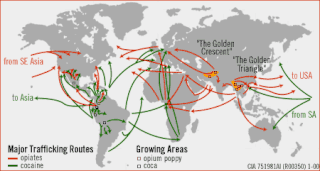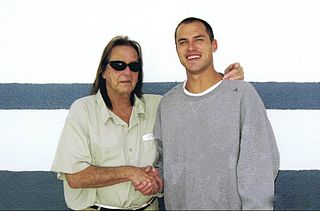Related Research Articles

The illegal drug trade or drug trafficking is a global black market dedicated to the cultivation, manufacture, distribution and sale of prohibited drugs. Most jurisdictions prohibit trade, except under license, of many types of drugs through the use of drug prohibition laws.

George Jacob Jung, nicknamed Boston George and El Americano, is an American former drug trafficker and smuggler who was a major figure in the cocaine trade in the United States in the 1970s and early 1980s. Jung was a part of the Medellín Cartel, which was responsible for up to 90% of the cocaine smuggled into the United States. He specialized in the smuggling of cocaine from Colombia on a large scale. His life story was portrayed in the biopic Blow (2001), starring Johnny Depp as Jung. Jung was released from prison on June 2, 2014, after serving nearly 20 years for drug smuggling.

Adler Berriman "Barry" Seal was a commercial airline pilot who became a major drug smuggler for the Medellín Cartel. When Seal was convicted of smuggling charges, he became an informant for the Drug Enforcement Administration and testified in several major drug trials. He was murdered in 1986 by contract killers hired by the cartel.
Brian O'Dea is a Canadian businessman, author, and television personality. A former drug smuggler, he is most well known for a large marijuana smuggling enterprise he masterminded in the mid-1980s. Set up to move marijuana in bulk from Southeast Asia to the Pacific Northwest and California, between 1986 and 1988 O'Dea's organization successfully smuggled 76 tons of marijuana worth about $300 million into Washington, transported it to California, and distributed it throughout the United States.

Basic is a 2003 mystery-action thriller film directed by John McTiernan and starring John Travolta, Connie Nielsen, and Samuel L. Jackson. It is the second collaboration of Travolta and Jackson, following 1994's Pulp Fiction.

Howard Saul Becker is an American sociologist who has made major contributions to the sociology of deviance, sociology of art, and sociology of music. Becker also wrote extensively on sociological writing styles and methodologies. Becker's 1963 book Outsiders provided the foundations for labeling theory. Becker is often called a symbolic interactionist or social constructionist, although he does not align himself with either method. A graduate of the University of Chicago, Becker is considered part of the second Chicago School of Sociology, which also includes Erving Goffman and Anselm Strauss.
Erich Goode is an American sociologist specializing in the sociology of deviance. He has written a number of books on the field in general, as well as on specific deviant topics. He is a professor at the State University of New York at Stony Brook.
Ciro Wayne Mancuso was a Nevada-based drug dealer convicted of running a $140-million marijuana smuggling operation for more than a decade. In cooperation with a foreign exchange student from Thailand, Mancuso built one of the largest domestic drug cartels in U.S. history.
Joel Smith is an English drug dealer and convicted murderer.

The Greek is a fictional character on the HBO drama The Wire, played by actor Bill Raymond. The Greek is the head of an international criminal organization involved in narcotics and human trafficking. The Greek is a mysterious figure involved in numerous criminal activities. His given name is never mentioned on the show, and he is known only as the Greek. A quiet and unassuming man, the Greek prefers to keep a low profile, operating all of his business through his lieutenant Spiros "Vondas" Vondopoulos. His smuggling organization operated from a small diner in Baltimore for years, and while Vondas would conduct business the Greek would listen in quietly at the counter. Nick Sobotka, upon seeing the Greek identify himself, was amazed that the shadowy figure had been in plain sight the entire time. He serves as the primary antagonist of the second season.

Kathryn Johnston was an elderly Atlanta, Georgia, woman who was killed by undercover police officers in her home on Neal Street in northwest Atlanta on November 21, 2006, where she had lived for 17 years. Three officers had entered her home in what was later described as a 'botched' drug raid. Officers cut off burglar bars and broke down her door using a no-knock warrant. Police said Johnston fired at them and they fired in response; she fired one shot out the door over the officers' heads and they fired 39 shots, five or six of which hit her. None of the officers were injured by her gunfire, but Johnston was killed by the officers. Police injuries were later attributed to friendly fire from each other's weapons.
The Wonderland Gang was a group of drug dealers involved in the Los Angeles cocaine trade during the late 1970s and early 1980s; their home base was located on Wonderland Avenue in the Laurel Canyon section of Los Angeles, California. On July 1, 1981, three members and one associate of the gang died in the Wonderland murders.
The Yogurt Connection was a drug smuggling ring that operated out of Indianapolis, Indiana, United States, in the late 1970s and early 1980s. Prosecutors estimated that the gang ran an estimated 250,000 pounds of Colombian, Jamaican and Thai marijuana. Distribution reached into eleven midwestern states and was valued at US$50 million to $100 million, making it the largest known ring of its kind at the time.
Pablo Acosta Villarreal, commonly referred to as El Zorro de Ojinaga was a Mexican narcotics smuggler who controlled crime along a two-hundred mile stretch of U.S.-Mexico border. At the height of his power, he was smuggling 60 tons of cocaine per year for the Colombians—in addition to the incalculable amounts of marijuana and heroin that were the mainstay of his business. He was the mentor and business partner of Amado Carrillo Fuentes, the so-called "Lord of the Skies", who took over after Acosta's death.

Banged Up Abroad is a British documentary/docudrama television series created by Bart Layton that was produced for Channel 5 and that premiered in March 2006. Most episodes feature stories of people who have been arrested while travelling abroad, usually for trying to smuggle illegal drugs, although some episodes feature people who were either kidnapped or captured while they were either travelling or living in other countries. Some episodes have featured real-life stories that first became well known when they were made the subject of a film: films that have been 're-made' in this way include Midnight Express, Goodfellas, The Devil's Double, Argo, Mr Nice and, to a lesser extent, Casino.
Jon Pernell Roberts, born John Riccobono, was a noted drug trafficker and government informant, operated in the Miami area and was an associate of Colombia's Medellín Cartel during the growth phase in cocaine trafficking, 1975–1986. After his arrest, he was able to avoid a lengthy prison sentence by becoming a cooperating witness and proactive informant for the federal government. He was the author with Evan Wright of American Desperado.
A drug lord, drug baron, kingpin or narcotrafficker is a high ranking crime boss who controls a sizable network of people involved in the illegal drug trade. Such figures are often difficult to bring to justice, as they are normally not directly in possession of something illegal, but are insulated from the actual trade in drugs by several layers of staff. The prosecution of drug lords is therefore usually the result of carefully planned infiltration into their networks, often using informants from within the organizations.
The illegal drug trade in Guatemala includes trans-shipment of cocaine to the United States. According to some reports, Mexican drug cartels such as Sinaloa have also established poppy growing operations there. There is a reported relationship between the Mexican Los Zetas cartel and the Guatemalan Kaibiles military force.

The Narcosobrinos affair is the situation of events that surrounded two nephews of Venezuelan President Nicolás Maduro and his wife Cilia Flores who were arrested for narcotics trafficking. The nephews, Efraín Antonio Campo Flores and Francisco Flores de Freitas, were arrested on 10 November 2015 by the United States Drug Enforcement Administration in Port-au-Prince, Haiti after attempting to transport 800 kilograms of cocaine into the United States. A year later on 18 November 2016, the two nephews were found guilty, with the cash allegedly destined to "help their family stay in power". On 14 December 2017, the two were sentenced to 18 years of imprisonment.
Jemeker Thompson-Hairston is an American former drug dealer who rose to the top of the cocaine trade during the peak of the 1980s crack epidemic in the United States. She was based in "South Central" Los Angeles and had cocaine distributors working for her in multiple cities of the United States.
References
Department of Homemakers Association of Colorado
- ↑ "Curriculum Vitae, Patricia Adler". 2014. Retrieved 1 July 2015.
- 1 2 "Patricia A. Adler". Department of Sociology Faculty. Boulder, CO: University of Colorado. 2009. Archived from the original on 19 September 2003. Retrieved 1 January 2010.
- ↑ "Peter Adler". Sociology and Criminology Faculty. Denver, CO: University of Denver. 2009. Retrieved 1 January 2010.
- 1 2 3 4 5 6 7 8 9 10 11 12 Adler, Patricia; Adler, Peter (2014). Constructions of Deviance: Social Power, Context, and Interaction. Boston: Cengage Learning. pp. 132–147. ISBN 978-1-305-09354-6.
- ↑ Adler, Patricia Ann (1984). "Wheeling and Dealing: An Ethnography of an Upper-Level Dealing and Smuggling Community". Sociology, Criminology and Penology.
- 1 2 3 4 5 6 7 8 9 10 11 12 13 14 15 16 17 18 Adler, Patricia A (1992). "The "Post" Phase of Deviant Careers: Reintegrating Drug Traffickers". Deviant Behavior. Hemisphere Publishing Corporation. 13 (2): 103–126. doi:10.1080/01639625.1992.9967904.
- ↑ "CU-Boulder students: Tenured professor Patti Adler being forced out because of prostitution lecture". Daily Camera. Colorado, CO. 2013. Retrieved 15 December 2013.